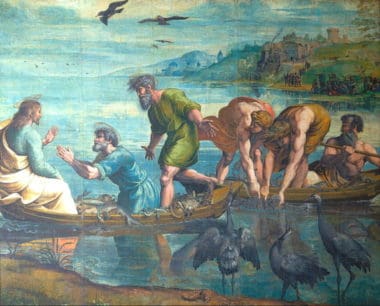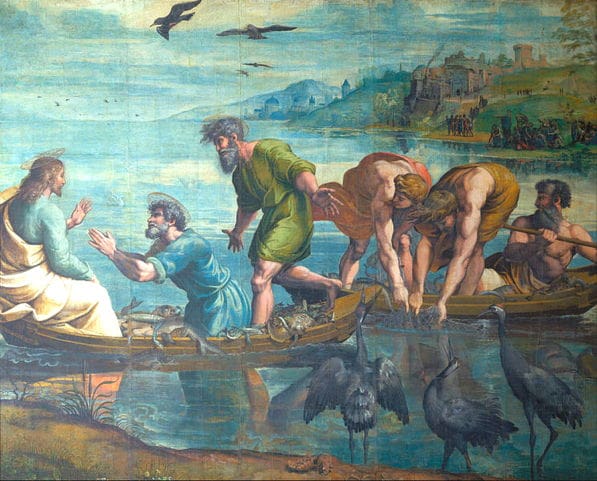Keeping Faith Alive During Life’s Dark Nights (Part I of IV)
When you come to the edge
of all the light you know,
and are about to step off
into the darkness of the unknown,
faith is knowing one of two things will happen:
There will be something solid to stand on
or you will be taught how to fly.
(Barbara Winter)
 It is foggy. The fog is so thick you could slice it. You step onto the plane and take your seat. The pilot taxis down the runway. It is time for the take-off. Why are you on that plane, with such thick fog when no one, not even the pilot can see? The answer must be that you have faith in the pilot and in the radar system directing the airplane confidently through the fog.
It is foggy. The fog is so thick you could slice it. You step onto the plane and take your seat. The pilot taxis down the runway. It is time for the take-off. Why are you on that plane, with such thick fog when no one, not even the pilot can see? The answer must be that you have faith in the pilot and in the radar system directing the airplane confidently through the fog.
Faith is the ability to accept as true something that we can’t prove is true, but we accept it as true, on the basis of who said it. We base the entire weight of faith on the reliability of the one who gives us their word. If we have grown to trust a person and know the person is reliable – we take that person’s word – we have faith. As in the case of the airplane taking off in the dense fog, we have faith in both the pilot and the radar system. We have faith in the airline which provided both the pilot and the radar.
Revelation and Faith
We cannot speak of faith separately from revelation. God reveals Himself, unveils Himself as it were, and shows Himself to us. The Lord approaches each of us in a particular, unique and personal manner, evoking from each one of us a personal and unique response. The approach of God to us is called Revelation. Our response to that  revelation is called Faith.
revelation is called Faith.
God first made Himself known to us by revealing Himself through the mediation of human persons in the Old Testament, and then perfectly through his Son, our Lord Jesus Christ in the New Testament. There is no God beyond “He Who reveals Himself” and now we have a way to Him. This way is Jesus (see Ephesians 2:18; 3:12).
Faith is the acceptance of this personal communication begun by God and accepted by us. It is the beginning of our intimacy with God; without it we cannot share in the fellowship of divine family life. The entire Bible makes it clear that faith in God is necessary. Nothing can replace it – neither human wisdom nor religious experience nor good works (see 1 Corinthians 1 2; Galatians 3:1 9 [sic]). Nothing.
Faith Penetrating the Veil of the Ordinary
 It is never enough to just believe in the notional. There was nothing speculative about the newborn infant shivering in the cold of the night. There was nothing intangible about wine at a wedding feast or fish so numerous and large that the boat nearly sank. There was nothing abstract about the scourging, the spitting and the nails.
It is never enough to just believe in the notional. There was nothing speculative about the newborn infant shivering in the cold of the night. There was nothing intangible about wine at a wedding feast or fish so numerous and large that the boat nearly sank. There was nothing abstract about the scourging, the spitting and the nails.
At the moment of the Incarnation, God truly entered into our everyday existence – our very human and ordinary routines. That is why our response must enter into our everyday existence – in the very fabric of our very human and ordinary routines.
St. Francis de Sales says what we need is “faith penetrating the veil of the ordinary.” He tells us that faith enables us to meet God in our ordinary, mundane, often pedestrian lives. He encourages us to develop and maintain a supernatural vision of the daily events in our lives.
Faith is Always Person-Centered
Faith is anchored always in relationship – a relationship with a person. Faith is my intellectual assent to the word of another person. When faith falters, it is because the friendship has faltered. The relationship has been allowed to grow distant.
If faith is kept healthy – growing, vibrant, dynamic — the integrity of both persons must always be respected. Each of us must come before Him just as we are and allow Him to come to us just as He is.
 There are almost 3,000 articles in the Catechism of the Catholic Church and the very first one, the foundation supports all of the tenets of our faith. It tell us that God, infinitely perfect and blessed in Himself, in a plan of sheer goodness, freely created us so that we could share in His own blessed life. For this reason, at every time and in every place, God draws close to us. He calls us to seek Him, to know Him, to love Him with all our strength. He calls together all people, scattered and divided by sin, into the unity of His family, the Church. To accomplish this, when the fullness of time had come, God sent his Son as Redeemer and Savior. In and through Christ, God the Father invites us to become, in the Holy Spirit, His adopted children and thus heirs of His blessed life.
There are almost 3,000 articles in the Catechism of the Catholic Church and the very first one, the foundation supports all of the tenets of our faith. It tell us that God, infinitely perfect and blessed in Himself, in a plan of sheer goodness, freely created us so that we could share in His own blessed life. For this reason, at every time and in every place, God draws close to us. He calls us to seek Him, to know Him, to love Him with all our strength. He calls together all people, scattered and divided by sin, into the unity of His family, the Church. To accomplish this, when the fullness of time had come, God sent his Son as Redeemer and Savior. In and through Christ, God the Father invites us to become, in the Holy Spirit, His adopted children and thus heirs of His blessed life.
Faith alone gives an accurate view of the unfolding of providence in daily life. Without faith, it is so easy to get tangled in conflicting desires. Faith gives God permission to work out His plan of salvation in our lives, even when we don’t get it. As St. Thérèse said, “Everything is grace.”
Editor’s Note: In Part II, we will look at the general patterns of growth that we all experience.
Copyright © 2013 | Carmelite Sisters of the Most Sacred Heart of Los Angeles, used with permission.
+
Art: Modified detail mirror of Msn 29702 LN 804 B767-432ER Delta Air Lines, Eric Salard, 18 October 2014, CCA-SA, Wikimedia Commons. God Called Moses, Corbert Gauthier, copyright 2007, all rights reserved, used with permission. The Miraculous Draft of Fishes, Raphael, 1515, PD-US author’s life plus 100 years or less, published in the U.S. prior to January 1, 1923, Wikimedia Commons. Catechism of the Catholic Church, file copy.




